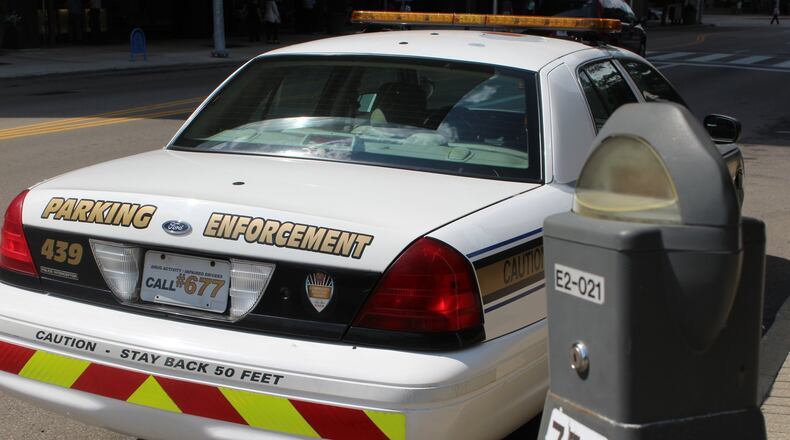But the city is considering changing its metered parking system, parking enforcement and fining practices to try to be more customer friendly and efficient.
The parking consultant recommended adding mobile device payment options, replacing old meters with smart technology and modifying meter fines to be lenient for early offenses and financially punitive for repeat violations.
“The overall goal of the report was to make it easier for people to park in downtown,” said Dayton Mayor Nan Whaley.
Dayton charges more than other mid-size cities in region
Vehicles caught at an expired meter in downtown Dayton will get a $35 parking ticket slapped on the windshield. But the fine is $20 if paid within 72 hours.
Even with the discount, however, the fine is double what people in Toledo must pay initially for an expired meter ($10) and it’s more than tickets in Akron and Canton ($12), according to data collected by this newspaper.
After 15 days of nonpayment, expired meter fines rise to $20 in Toledo and $15 in Akron. Canton’s fine, if left unpaid, increases to $15.
Dayton’s financial penalty is more akin with the state’s three largest cities — Columbus, Cleveland and Cincinnati.
City officials said that’s because downtown is the urban center of the state’s fourth largest regional market, even though it is really the sixth largest city in Ohio. Dayton officials said the 72-hour markdown is very effective at getting people to pay their tickets quickly.
Vehicles parked at an expired meter in Cleveland receive a $25 penalty, which increases by $10 if not paid within 15 days.
In Columbus, the unpaid meter fine starts at $30 then climbs to $45 if not paid within 10 days. The initial fine in Cincinnati is $45 and gets increasingly more expensive, doubling to $90 after 21 days.
Consultant recommendations
Michigan-based parking consultant Andrew Miller, with Carl Walker Inc., evaluated the city of Dayton’s on-street parking system.
Miller’s report, which was finalized earlier this month, notes that Dayton’s expired meter fines are higher than comparable cities, including Toledo, Fort Wayne, Ind., and Lexington, Ky.
Miller recommended Dayton reduce the fine for expired meters to a “more reasonable level,” as well as implement a graduated fine structure that increases costs for repeat offenses.
Miller, as an example, said the first parking ticket received within a 12-month time period could be a warning, and the second fine could be $10. Fines could increase to $20 for offenses three to five, and increase to $40 or $50 for violations six and beyond.
Miller also recommended the city add technology that allows drivers to pay for parking using their mobile phone, which citizens have indicated they want.
He said the city should replace its coin-operated meters with meters that accept credit and debit cards. Currently, about 35 percent of meters downtown are smart meters.
Mayor Whaley said she wants meter enforcement to be more friendly, and she hopes meter maids in the future will patrol in smaller vehicles or will not use them.
Whaley said she would like the city to issue warning tickets for first-time or infrequent meter violations.
But she said that most people who get a ticket for a meter violation in Dayton pay within 72 hours. The fine is right where it should be — it’s a little higher than Ohio’s smaller metro areas but lower than the largest urban centers, she said.
The city will likely act on most of the consultant’s recommendations in 2017, but the biggest challenge is that the city has many meters that do not accept credit cards and mobile payments, Whaley said.
Dayton uses its on-street parking system to serve downtown employers and visitors, and parking fines and enforcement are intended to ensure there is sufficient turnover at the spaces, said Dayton City Manager Shelley Dickstein.
Dickstein said the city will have to complete more policy analysis to determine what kind changes to the fining structure and parking system might make sense. The city plans to issue a request for proposals for a pay-by-mobile parking option and wants to replace its coins-only meters with smart technology.
“There will be more than likely some tweaks right now, but I can’t tell you what they are right now,” she said.
But Dickstein said the consultant’s data show Dayton’s system is not overly aggressive or punitive.
Dayton has more on-street parking meters than Akron, Fort Wayne, Lexington and Toledo, according to Carl Walker Inc.
But the city each year issues fewer parking tickets — 17,133 — than Fort Wayne (18,365), Lexington (43,000) and Toledo (23,000). Data for Akron was not immediately available.
Dayton’s annual parking enforcement revenue is about $386,800, which compares to $648,000 in Toledo and nearly $860,000 in Lexington.
However, Dickstein agrees that meter enforcement aides can be better ambassadors for downtown.
She said they hopefully will cease to use “paramilitary” or police tactics to enforce the parking laws, such as boxing cars in to prevent them from leaving as a ticket is being written up.
Other recommendations from the consultant focused on updating and enforcing zoning laws to address issues at surface parking lots. The consultant said the city should improve signage to help direct motorists to the city’s parking garages.
About the Author

